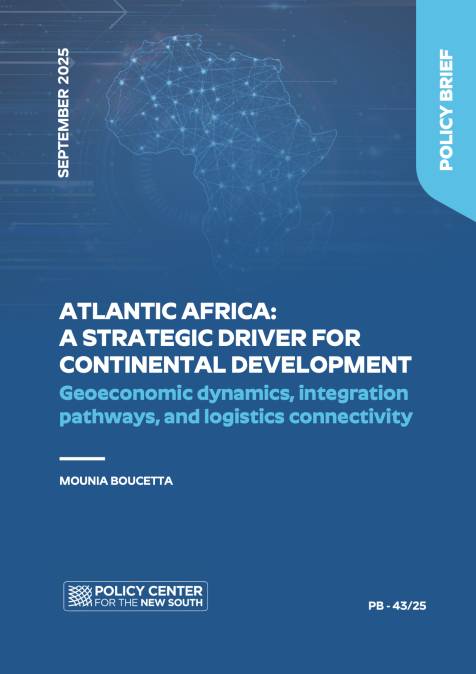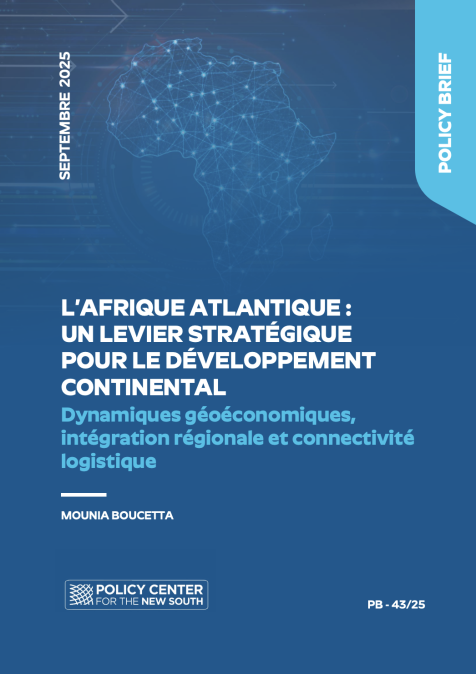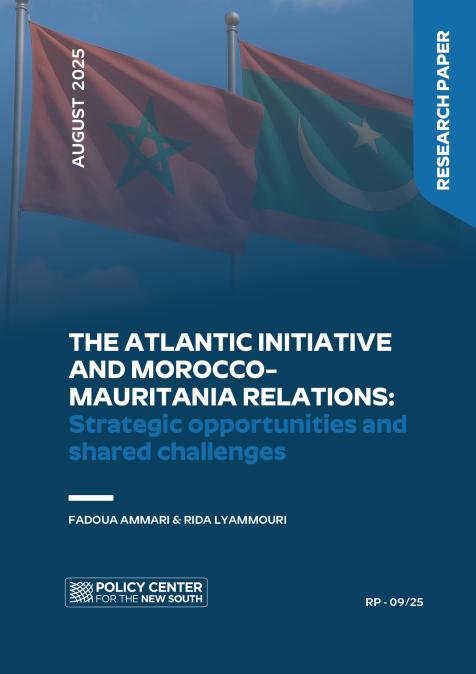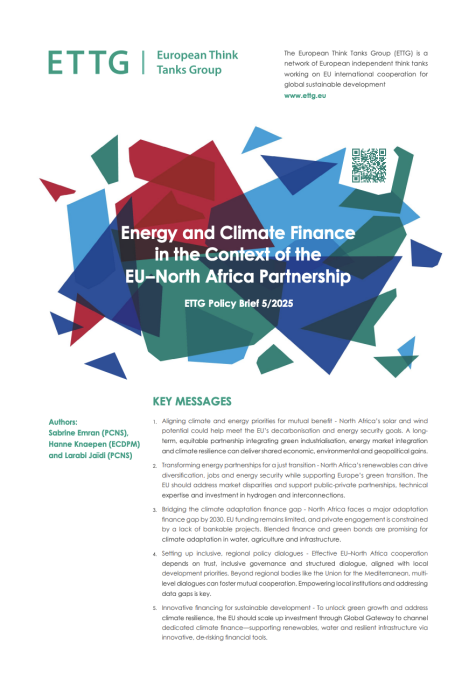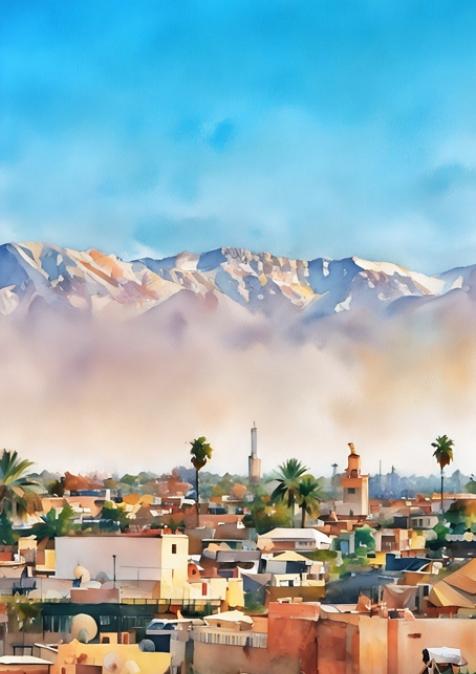Publications /
Policy Brief
The global wave of democratic retrenchment has not spared North Africa as seen in the cases of Tunisia and Sudan, where democratic transitions have stalled or regressed into autocracy. How do to explain Tunisia and Sudan’s troubled transitions from authoritarian rule? Both states are attempting to transition from single-party authoritarianism. In both cases, economic crises exacerbated by COVID, the Russian-Ukraine war, and involvement by external actors stymied the fragile transition process. But there are also clear differences in the role of European powers, the strength of political parties and civil society actors, and discourses of national identity.
INTRODUCTION
The global wave of democratic retrenchment has not spared North Africa as seen in the cases of Tunisia and Sudan, where democratic transitions have stalled or regressed into autocracy. In July 2021, a decade after the start of the North Africa and Middle Eastern uprisings in Tunisia, President Kaies Saied dismissed Prime Minister Hicham Mechichi, dissolved parliament and took on extraordinary powers. In October 2021, the Sudanese military declared a state of emergency, disbanded the civilian leadership and removed Prime Minister Abdullah Hamdok from office, placing him under house arrest. A month later, Hamdok was reinstated. The prime minister and General Abdelfattah al-Burhan then appeared on national television and signed a power-sharing agreement with the Forces of Freedom (FCC) - an umbrella group representing opposition groups, military, armed and civilian - that would ostensibly allow Hamdok to form a government and hold elections before July 23. The Sudanese military stepped in three years after a broad-based protest movement toppled Omar al-Bashir from office in April 2019. The coup of October 2021 in effect derailed Sudan’s transition process, creating an ongoing political deadlock, with protest leaders and political parties divided on how to negotiate with al-Burhan. Various attempts at international mediation led by the so-called Troika of the United States, the United Kingdom, and Norway have not been successful.
How can analysts understand Tunisia and Sudan’s troubled transitions from authoritarian rule? Political scientists have termed this type of instability “democratic careening,” that is “the political instability sparked by the intense conflict between partisan actors deploying competing visions of democratic accountability.”1 Both states are attempting to transition from single-party authoritarianism: the police chief Zine El Abidin ruled through the Neo- Destour party, and al-Bashir through the National Congress Party. In both cases, economic crises have been exacerbated by COVID and the Russian-Ukraine war, and involvement by external actors has stymied the fragile transition process. But there are also clear differences in the role of European powers, the capacity of political parties and civil society actors, and discourses of national identity.
CONSOLIDATION
The late scholar Samuel Huntington argued that a transitioning regime required a “two- turnover test,” that is, two electoral cycles to be considered a “consolidated democracy.” By this measure, Tunisia by 2014 had the hallmarks of a competitive electoral democracy with successive presidential and legislative elections, validated by international monitors. Political scientist Nate Grubman has argued, competitive elections are supposed to allow voters to choose the political party offering the more attractive policy solution, but Tunisia’s political parties didn’t present comprehensive, distinguishable political platforms or policy agendas. The weakness of Tunisia’s political parties be it Ennahdha or Nidaa Tunis has in turn led the Tunisian legislature to form broad coalitions or non-partisan governments that have little appeal to the voters. Consequently, policy in critical areas like judicial reform or security sector reform has been shaped more by deal-making between state and private sector elites making between private sector rather, than by the Tunisian electorate.2 Small wonder that a recent Arabarometer study reported that, “what pundits seem to have missed is that relatively few Tunisians believe they currently live in a democracy.”3
The intra-elite political struggle underway in Tunisia is the result of two divergent visions of democratic governance, both presented as an alternative to party-based electoral democracy. As Grubman explains, one side viewed deliberation and consensus-building between elites as a viable approach. This was the thinking that underpinned the Constituent Assembly election of 2011, the National Dialogue of 2013 and 2016, when then-President Essebsi brought together a bevy of political parties and civil society actors, who then produced a charter for a new government. Critics have retorted that this paradigm of elite deliberation simply maintains the status quo as the same elites remain in government. The second conception sees direct democracy as a model: this was the approach championed by the protest movement and Saiedi who is fiercely critical of political parties. Despite these conflicting visions, there was enough consensus among Tunisian political elites to allow for successive elections to take place for a decade. By 2021, that agreement had begun to crumble.
In early 2021, as the Tunisian economy, battered by COVID-19, faltered, the Tunisian Labor Federation (UGTT) called on Saied to initiate another national dialogue. Instead, in July 2022, he suspended parliament, a move that may have placated Tunisians tired of government paralysis. The president then organized a referendum on a new constitution. The document passed even with a low voter turnout of 30% and a boycott by opposition groups and granted the president even wider powers.4 Saiedi, a law professor, has frequently expressed his aversion to political parties and elite politicking, and claimed that the 2014 constitution had impeded government action in dividing power between President and Parliament.5 Observers have noted that he was elected in 2019 because he was viewed as an alternative to the Ennahdha party. Analyst Nadia Marzuki writes that Saied in June 2021 called for “a new political system and a real constitution because this constitution is based on putting locks everywhere and institutions cannot proceed with locks or deals.” He then sought to place greater power in the presidency and set up locally elected councils to “decentralize” national representation. Critics, in turn, state that the new constitution was eroding the checks and balances between the President and parliament, as well as the rights of free speech and gender equality, enshrined in the earlier constitution.
In June 2014, President Moncef Marzouki had launched Tunisia’s Truth and Dignity Commission (hai’at al-haqiqa wal karama), an independent tribunal aiming to investigate human rights abuses, to bring perpetrators to justice, and to give recompense to victims. Saied’s recent power grab, critics note, runs counter to the committee’s mission. Marzuki quips that in contemporary Tunisia, “transactional justice has replaced transitional justice.” She offers the example of the Economic Reconciliation Act of 2017, which granted amnesty to civil servants accused of corruption provided they could show they had not personally profited from embezzling funds. Essebsi introduced this measure to bolster investor confidence. The law sparked protests by groups like the (like Manich Msamah – “I will not forgive”) who say the law is offering immunity to perpetrators.
THWARTING DEMOCRACY
Sudan’s political impasse has multiple causes. In Sudan’s Unfinished Democracy, Alex De Waal, Justin Lynch, and W.J. Berridge place the Sudanese revolution in the historical context considering the earlier uprisings of 1964, 1985 and the more recent 2013 protests, which drew a forceful crackdown, laying the ground for the 2018-2019 wave of protests. The authors say the uprisings stemmed from an acute economic crisis created by Al Bashir’s wasteful policy of funneling oil revenue into the military, instead of into welfare and economic investment. The independence of South Sudan in 2011 exacerbated Khartoum’s economic woes, depriving the regime of foreign exchange. Sudan’s inability to access international aid is due to its being on Washington’s terrorism list and to ICC indictments over the Darfur conflict.6 The nucleus of the Sudanese revolution was Sudan’s Professional Association (the SPA), an organization of urban professionals, connected to a network of neighborhood Resistance Committees (RCs). As in Egypt and Tunisia, the SPA and the RCs were ill-prepared for the transition process. As the authors observe, “the SPA focused on the one consensus demand: Tasgut, bas! Al-Bashir must go. This agenda was its strength in the short term and its weakness thereafter.”
Analyst Hamid Khalafallah has produced a compelling analysis of the role played by the RCS in Sweden, showing how shortly after the coup of October 2021, they arranged a process of grassroots dialogues to produce political charters outlining a vision for the transition process and a democratic Sudan. They were responding also to the 2019 Constitutional Charter which had granted the military a place at the heart of the government, in effect granting military leaders veto power over the transition process. The RCS would produce various charters by March 2022. Two charters garnered widespread support - the Revolutionary Charter for People’s Power (RCPP) was signed and backed by 15 states, and the Charter for the Establishment of the People’s Authority (CEPA).7 But the military has repeatedly foiled these bottom-up efforts. De Waal, Lynch, and Berridge show that Sudan’s military was not a unified entity: there was a split within the army, represented by General al-Burhan and the Rapid Support Forces led by Muhammad Hamdan Dagalo (Hemedti). The Borhan-led military had strong links to the political opposition with children of military officers and politicians joining the protests, which, in turn, led the military to exercise a degree of restraint. In contrast, Hemedti’s forces, with roots in western Sudan, had no such ties and thus cracked down on protestors. Sudanese protesters were inspired by the Algerian hirak protests unfolding at the same time. Moreover, as Lynch has observed, state officials also learned from other Arab countries. Sudan’s National Intelligence and Security Services (NISS), saw how a delayed crackdown in Egypt and Tunisia’s uprisings allowed protesters more political space, so they repressed the uprising of early 2012 swiftly and likewise moved rapidly against activists in September 2013.
One obvious parallel between Tunisia and Sudan’s aborted democratic transition is the role of external factors including the African Union, the EU, the US, the UN, and the Gulf states. Intervention often came with strings attached. Sudan, for instance, could not receive foreign aid, because it was on Washington’s list of State Sponsors of Terrorism, due to al-Bashir offering refuge to Bin Laden in the 1990s. The Trump administration agreed to remove Sudan from the list, only if Khartoum normalized ties with Israel. As the Washington Post editorialized last year, “behind the power grabs in Sudan and Tunisia” lurked “the shadow of Gulf monarchies.” Burhan’s military takeover came shortly after talks with American envoy Jeffrey Feltman. The Biden administration embarrassed by Burhan’s actions moved to freeze $700 million dollars in aid intended to support Sudan’s transition. And as had occurred in Egypt, Sudan replaced American financial assistance with funds from the Gulf. In April 2019, Saudi Arabia and UAE pledged to send 3 billion in aid to Sudan. Analyst Jean-Baptiste Gallopin would write, “Financial support from Saudi Arabia and the UAE gave the generals crucial leeway to resist popular demands for civilian rule... The Emirates’ covert financial flows subsequently earned them unparalleled leverage across large segments the political spectrum, which helped the generals, and in particular, Hemedti, consolidate their power.”8
Al-Burhan had the backing of the Egyptian regime as well. He received multiple visits from Abu Dhabi’s Crown Prince. In March 2020, al-Burhan visited Saudi Arabia where Bin Salman pledged the readiness of the Saudi investment fund to invest in Sudan. Revealingly, Egypt, Saudi Arabia, and UAE did not denounce al-Burhan’s coup, but rather appealed for calm; they, on the other hand, actively cheered the Tunisian President’s power grab. The Arab Troika supported Saied, in part because he was seen as a counter to Ennahdha. (Al- Burhan was similarly viewed as anti-Islamist.) As Saied negotiated with the International Monetary Fund for a loan, and Tunisia’s economic situation worsened, he also entered into talks with Saudi Arabia and UAE for financial support. It’s worth recalling that the two Gulf monarchies bailed out the Sisi regime financially in 2013. A recent report from ICG submits that Western actors who want to support Sudan’s democratic transition can do pressuring Riyadh and Abu Dhabi: “The U.S. and EU should use the considerable leverage they have with Gulf capitals and Cairo to convince them to push the generals in Khartoum to change course.”9 Marc Lynch recently observed that the UAE and Egypt supported the Sudanese military against the civilian opposition, even though the Sudanese revolution was against an Islamist regime. The Hamdok government upon assuming power, had moved to declaw the Tamkin projects, Islamist institutions from the Bashir era that had gained a significant foothold within the government and the economy. UAE supported the purge and Hemedti’s heavy-handed approach against a civilian opposition they saw as Islamist-adjacent.10
Looking at the horn of Africa more broadly, Gulf states have played a positive role in tamping down regional conflicts; whether it is Qatar playing a mediating role in the Darfur conflict, or helping to negotiate a deal between Eritrea and Djibouti. Likewise, Saudi Arabia facilitated the peace accord between Ethiopia and Eritrea, signed in Jeddah in September 2018. In 2018, Saudi Arabia also set up the Red Sea Forum for Coastal States composed of Saudi Arabia, Yemen, Sudan, Djibouti, Egypt, and Somalia (Eritrea refused to join, preferring a bilateral relationship with Riyadh). As one account noted, the Gulf actors, “are able to fund agreements more quickly and completely than most Western donors, offering the promise of a tangible peace dividend.”11 But the Gulf states’ preference for autocratic rule, (or in the case of Qatar and Turkey, Muslim-Brotherhood-related groups), is a cause for concern, especially as various African countries – Tunisia, Ethiopia, and Sudan – attempt to transition to democracy.
NEW SOCIAL MOVEMENTS
New identitarian movements emerged in the wake of the 2011 uprisings, starting in Tunisia where the “Arab Spring” first began. In July 2011, the Tunisian Association for Amazigh Culture was established. It has since morphed into the Akal (Land) party, the only Amazigh political party in North Africa, calling for an amendment to the Tunisian constitution which, in the preamble, underscores Tunisia’s “Arab Muslim” identity; and the repeal of a civil status law that bans non-Arabic names for newborns. In 2012, Tuareg rebels in Mali proclaimed the Berber state of Azawad (2012-2013) – the first Berber state since the equally short- lived Rif Republic (1923-26) of northeast Morocco. In July 2011, an Amazigh movement appeared in eastern Libya launching a radio station, and makeshift schools and is currently calling for constitutional recognition.
The advances made by Amazigh movements in Morocco and Algeria since 2011 have been especially impressive. In Algeria, protests led the Algerian government to recognize Tamazight as an official language in 2016. The blue, yellow, and green pan-Amazigh flag has become in some ways the flag of the Algerian hirak, prompting the regime in July 2019 to ban the tri-couleur. Another effect of the Arab Spring and the pivot to Africa is the emerging discourse on slavery and racism in the Maghreb. Local activism combined with increased migration from “sub-Saharan” Africa has sparked a conversation about racism. In October 2018, Tunisia passed a law calling for the “Elimination of All Forms of Racial Discrimination,” and defending the rights of the purported 10 percent of Tunisians who identify as black. In Morocco, the magazine covers recall the history of slavery and ask, “Are We Racist?” In response to EU pressure and a desire for better relations with ECOWAS states, Morocco is trying to liberalize migration law, launching regularization campaigns in 2014 and 2017, whereby undocumented migrants gained residency cards. Algeria, in July 2017, began a similar regularization effort. Tunisia is a largely homogenous population, and has a small Amazigh population and thus has not faced movement calling for a rethinking of national identity. Sudan however is facing new identitarian movements and discourses as part of its revolution.
WHO ARE WE?
The conversation over whether Sudan is Arab, African, or Nubian, and whether the country should withdraw from the Arab League has been raging since the downfall of the Bashir regime in July 2019, if not earlier. Observers have noted that alongside this discourse, a Kushite revival is underway, propelled by the protest movement. Despite the occasional references to the kingdom of Kush and ancient Nubia in the popular and intellectual culture of independent Sudan, it is fair to say that the history of ancient Nubia has long been marginalized in Sudanese political imagination and public discourse.12 This is largely because the regime in Khartoum has seen Kush as a past that needed to be transcended, and because archeologists of Nubia have long seen the kingdom of Kush as part of Egyptian, not Sudanese history. When the Sudanese revolution erupted in January 2019, images and allusions to Nubia burst into the public sphere. The most mediatized moment of this Kushite revival was the image of activist Alaa’ Salah atop a car surrounded by protestors, as she read a poem titled “My grandfather is Tirhaqa and my grandmother is a Nubian queen (kandaka.)”13
As observers have noted, this current Kushite revival, catalyzed by the current revolution, has roots in the protest movement that took off in 2007 around the proposed building of the Kajbar damn in northern Sudan which would have flooded a large part of historic Nubia, leading to environmental destruction and the displacement of an untold number of people.14 One Nubian rights group that emerged then, and has gained prominence today is the Kush Liberation Movement (KLM), which is calling for the teaching of Nubian languages and also participating in peace talks in Juba.15 The Nubian movements, like their Amazigh counterparts, are reacting to Arab-Muslim authoritarian regimes, and excavating an ancient Nubian past to create a Nubia-centric narrative that can unify Sudan. Thus, Mahmoud Suliman Bashir, Director of Regional Antiquities for River Nile State, organized a conference in early 2020 titled, “The Role of Antiquities and Tradition in the Promotion of Peace.” His stated aim is to create a revolutionary archeological project to undergird a new historical narrative and identity for Sudan.
A reformed archeology is thus emerging in Sudan aiming to dislodge the northern-centrism that has afflicted the country for generations, hoping to produce a more inclusive historical narrative that challenges the view of the North (including Nubia) as the source of Sudanese history and civilization, while eliding the histories and memories of those on the periphery. Yet while the Nubian revival is a response to the dominant discourse of Islam and Arabism, as is the project to decolonize Sudanese archeology, it would be reductive to see this resurgence as anti-Islamist, for as historian Noah Solomon writes, “This recent rise of Kush has been made possible in great part due to the sponsorship of the archeological sites by the Emir of Qatar,”16 who is also a key backer of Islamist politics in Sudan.
In sum, the Tunisian and Sudanese democratic transitions are at an impasse, but movements and politics are still strategizing for a new opening and negotiating with leaders against overwhelming odds.
2. https://apsamena.org/wp-content/uploads/2021/10/MPN_Grubman_ng-FINAL.pdf
3. https://www.arabbarometer.org/2021/07/tunisias-democratic-pulse/
5. https://www.tandfonline.com/doi/pdf/10.1080/13629395.2015.1081449
6. https://www.hurstpublishers.com/book/sudans-unfinished-democracy/
8. https://pomeps.org/the-great-game-of-the-uae-and-saudi-arabia-in-sudan
9. https://www.crisisgroup.org/africa/horn-africa/sudan/reversing-sudans-dangerous-coup
10. https://abuaardvark.substack.com/p/sudans-revolutionary-struggle
11. International Crisis Group, Intra-Gulf Competition in Africa’s Horn: Lessening the Impact Report # 206, Brussels (September 19, 2019)
12. Amal Ibrahim Madibbo, “Conflict and the conceptions of identities in the Sudan” Current Sociology (May 2012)
13. Noah Solomon, “New histories for an uncharted future in Sudan,” AIAC (May 17, 2019) https://africasacountry.com/2019/05/new-histories- for-an-uncharted-future-in-sudan
14. “Sudan’s anti-dam movement fights the flooding of Nubian culture,” The Guardian (December 12,, 2014)
15. “Kush Liberation Movement Affirms Its Concern With Sudanese People Issues,” Allafrica.com (January 30, 2020)
16. Noah Salomon, “What Lies Beneath the Sands: Archaeologies of Presence in Revolutionary Sudan” (POMEPS, May 2020)


